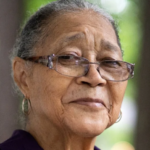By CARSON CAPSHAW-MACK
Winston-Salem Journal
WINSTON-SALEM, N.C. (AP) _ As Caesar Sant draws his bow back and forth across his small violin, the pinky finger on his right hand starts to quiver ever so slightly.
It’s the result of a stroke the 4-year-old suffered two weeks ago, his second in six months. And it’s just one of the complications he’s faced in his short life after being born with sickle cell anemia.
While other toddlers watched “Dora the Explorer,” Caesar was learning to play Antonio Vivaldi’s Concerto in A minor on the violin. A child prodigy, Caesar began playing violin at 2, but now his ability to play _ and live _ are in jeopardy because of the inherited immune disorder.
“When he grabs the bow, I can see he’s kind of a perfectionist,” said his father, Lucas Santos. “When he doesn’t do something good he gets upset, but when he does it well, you see the smile on his face, and I just cry.
“It’s really touching. And everybody is really devastated.”
Caesar’s parents are both natives of Brazil. His father is a neuroscientist at Wake Forest School of Medicine, and his mother is a stay-at-home mom who was a lawyer in Brazil.
They are trying to raise money for a stem cell transplant in hopes of curing his sickle cell anemia. The cost of the procedure _ which could run as high as $500,000 _ has to be performed at a center that specializes in stem cell transplants and likely would not be covered by the family’s insurance.
When Caesar was hospitalized after his most recent stroke, doctors said that only 20 percent of his blood cells were healthy, Santos said. Sickle cell is a condition in which there aren’t enough healthy red blood cells to carry oxygen throughout the body. Normal red blood cells are round and flexible, but sickle cell anemia is characterized by cells that become rigid and shaped like a sickle. Those can get stuck in blood vessels, slowing or blocking blood flow and limiting the flow of oxygen.
In the U.S., sickle cell anemia is most often associated with African Americans, but it occurs most often in people whose ancestors lived in tropical and sub-tropical regions where malaria is frequently found.
According to Dr. Thomas Russell, a pediatrician at Wake Forest Baptist Medical Center, sickle cell anemia can be cured by stem cell transplants. The process is long and costly, but worth it, the Santos family said.
It would involve an in vitro fertilization treatment for Caesar’s mother, Aline Santos. Doctors would implant only cells that are a genetic match, then stem cells would be collected from the umbilical cord after the baby’s birth.
The in vitro treatment will be covered by insurance, Aline Santos said. Any money raised would go to the stem cell transplant for Caesar.
Caesar’s sister, 3-year-old Maria-Anita Sant, was also born with sickle cell anemia. “The ultimate goal is to have her also get treatment,” her father said. Unlike her brother, however, Maria-Anita has not experienced any complications from the disease.
“We never thought about it before because they didn’t have a problem,” Aline Santos said. “But now our concern is that he already had two strokes, and it’s like he is normal now, but we don’t know if he could have another one two or three months from now.”
They say Caesar showed an interest in violin at 9 months.
“We bought him a toy violin, and every time he would see someone play the violin he would pick up his toy and make the movement like he was playing,” his mother said.
When he was 2, his parents signed him up for lessons with Fabrice Dharamraj, a faculty member at Wake Forest University. Three months later, Caesar began taking lessons with his current teacher, Hongmei Zhou of the Winston-Salem Symphony, who sometimes instructs him in Chinese as well as English.
“We have a good relationship,” Zhou said. “We’re kind of like friends. In the lesson he has fun, and I have fun, too. He is very talented.”
But because of his most recent stroke, Caesar’s lessons have not been as frequent and he is undergoing physical therapy to help regain strength and movement in his right hand.
Caesar is learning to speak six different languages, including his parent’s native Portuguese. “He watches cartoons in other languages. He really likes Chinese,” his father said.
Lucas Santos gleams as he shows off Caesar’s certificates for performing at a second-grade level in math and earning a spot on the top 100 North America Kumon Math Student Honor Roll from Kumon Math and Reading Center.
Caesar’s parents say they would be fine if he decides he no longer wants to play violin, that they only want him to be happy.
“I think we are giving him the opportunity, and that’s the main goal,” his mother said. “And in the future, he will have to decide. We are not the ones pushing him. He’s the one pushing himself.”
Added his father: “I try to not push too much because he gets frustrated. Kids are so smart, every kid is a prodigy.”
Aline Santos said the last few months have been discouraging.
“When you have a dream to have your child, and then you see that anything can come in life and want to take him from you, it’s something so scary,” she said. “And when we look at him, we want to see his dream, and he wants to play the violin, and we think, my gosh, maybe he can’t do that if we don’t get him the treatment right now.”
As Caesar pulls the bow across the strings for the final note of his favorite Vivaldi concerto, his father’s eyes fill with tears.
“It’s more than a dream, it’s more than a dream,” he says of Caesar receiving the needed treatment. “It’s time to think positive.”
___
Information from: Winston-Salem Journal, http://www.journalnow.com











